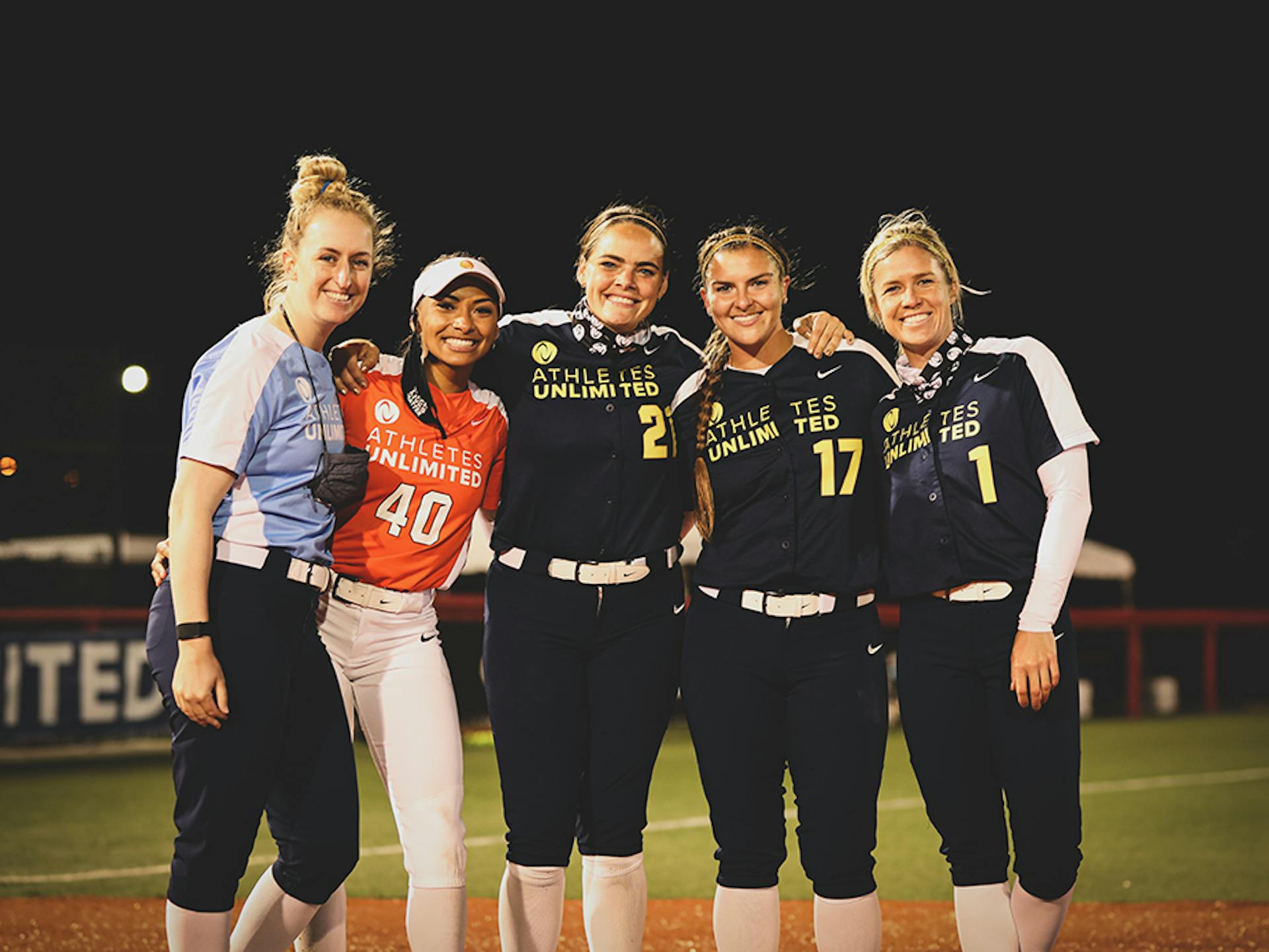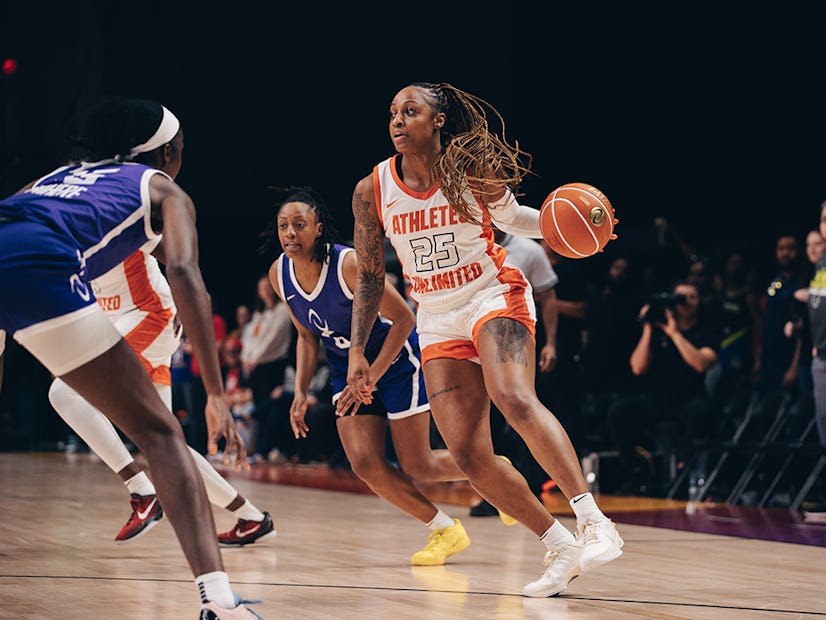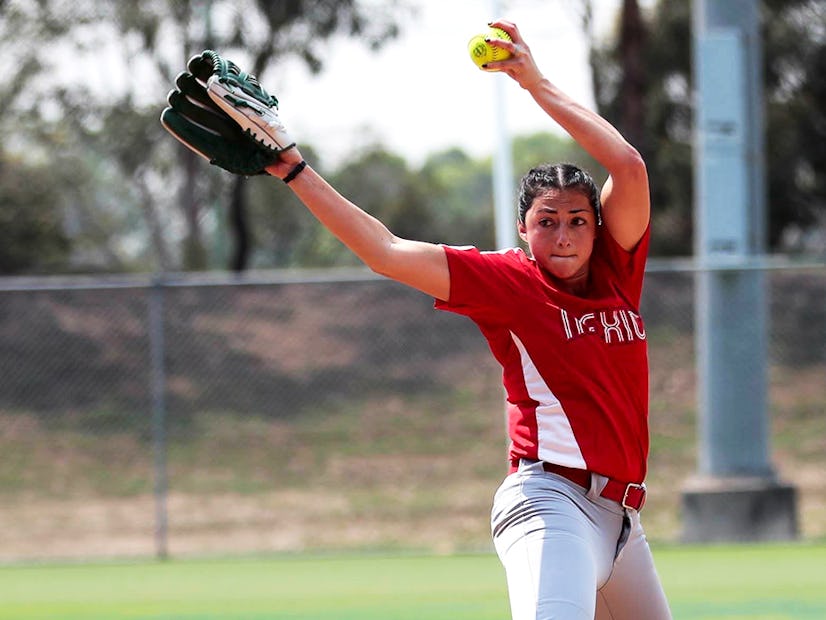
Central to success, Player Executive Committees lead Athletes Unlimited with their voices
Brimming with pride, members of the Athletes Unlimited Softball Player Executive Committee (PEC) stood together on a floodlit field in Rosemont, Illinois, in late September.
There were awards to hand out and a few more hugs and high-fives to exchange as the curtain came down on the inaugural softball season.
While embracing each other, the five members of the Softball PEC embraced the moment to bask in the glow of pulling off a successful season, having done so in the middle of a coronavirus pandemic.
“It was immense pride,” said Victoria Hayward, PEC member and the most prolific leadoff hitter of Athletes Unlimited’s first season. “I don’t know if I have ever been more proud of an accomplishment with another group of people because it was a collective effort of everything that went into it but also the execution of all the rules we had and how we were able to really put the league and everything first.
“Going into the pandemic we had thought of every single way it could go wrong. To be at the end, having experienced something new and awesome and realizing all the barriers we had to go through was incredibly rewarding. I remember hanging with the four of them, standing arm in arm and taking in the celebration. It was so rewarding and so special and really was the icing on the cake to the whole journey.”
It’s a journey that’s just beginning for Athletes Unlimited, and the PECs are central to the success of all three of the organization’s sports: softball, volleyball and lacrosse.
The PECs meet weekly and interact often with co-founders Jon Patricof and Jonathan Soros to discuss everything from sponsorships and broadcast deals, to the unique scoring systems and player recruitment, to diversity issues and policies affecting personal needs of the women who play within Athletes Unlimited. It’s all about empowering women and giving them a true say in how their sports are run.
Hayward’s colleagues on the Softball PEC are Sam Fischer, Jazmyn Jackson, Gwen Svekis and Haylie Wagner.
The Volleyball PEC is made up of Kristen Tupac, Jordan Larson, Cassidy Lichtman, Molly McCage and Taylor Morgan.
The Lacrosse PEC is made up of Amber McKenzie, Mira Shane, Kayla Treanor and Michelle Tumolo.
Having such a committee is one reason Larson considered Athletes Unlimited.
“I just finished my 13th pro season, which is kind of scary to say,” she said. “What we really miss in the volleyball community is having a pro league in the States. A lot of girls overseas, the desire to play in the States is there. Just speaking with Jon and Jonathan initially and seeing how they were going to run it, I thought this could be the real deal. I wanted to jump on board from the start and really get this going and create something that can last and hopefully be a good product for many years to come.
“Initially, I didn’t know fully of the extent of the voice we would have, but the more involvement that I’ve had through the process, it’s been really super empowering and definitely is something that has never been done before. And I think that it’s definitely added to the value of that, as well.”
While all other pro sports leagues work on a top-down basis – owner to general manager to coach/manager to player – Athletes Unlimited puts the players in key decision-making roles.
“Athletes don’t always have the option or the ability or the access to talk to the owners of the league, and we do,” McKenzie said. “I think that’s what’s so neat about the experience because from the beginning, before I even signed on, we had a call with Jonathan and Jon, just to discuss what it was all about. I think their accessibility is what is so different than any other professional league, in my opinion.”
The PECs don’t operate in a vacuum. They regularly report back to and answer questions from all of the athletes in their sports. There also is cross talk among the groups. Softball players have the benefit of having played a season while volleyball players gear up for a Feb. 27 start in Dallas, Texas, and lacrosse players prepare for their first season in July.
Players from the lacrosse and volleyball PECs credit softball PEC member Svekis for giving them an advanced scouting report, so to speak.
“We’ve been in contact with Gwen and she kind of lets us in on the inside scoop of what worked and what didn’t work and what we can use for volleyball,” Morgan said. “I look for it to be strengthened and more connection and communication with the softball athletes here in the near future.”
Svekis, a vocal leader both on and off the softball field, was quick to credit PEC colleague Jackson for helping to create the Friday Night Lights program during the softball season. On the eve of the weekend’s games, many players would gather on Friday nights to discuss issues such as racial discrimination, LGBTQ rights and other issues. Jackson worked with players Erika Piancastelli and Aleshia Ocasio to get the ball rolling.
It’s a program that gained notice of PEC members from other sports.
“I think that especially in this climate that we’ve been going through, it’s been realized that lacrosse really isn’t as diverse as it can be,” said Shane. “We have a ways to go. I think one of the most important things that I’m looking forward to is, kind of on an emotional level, all the change that we’ll be able to make in our five weeks (of play). Amber and I sit on the Racial Equity Committee.
“It’s been incredible to hear from the softball players what they’ve been able to do with Friday Night Lights and have impactful conversations that bring the sport forward. So I’m just excited to have emotional and impactful conversations with people about race, what it means to me to be a biracial lacrosse player and one of the only biracial lacrosse players at the professional level and continuing onto the field and being able to connect with people and move this game forward.”
No matter what the color of their skin is, no matter where they come from, they have a place in this sport and they can make it here.Michelle Tumolo,Athletes Unlimited Lacrosse Player Executive Committee Member
For Svekis, success for the softball PEC and the league itself boiled down to players being accountable.
“I think that the only way for us to have gotten through the COVID restrictions the way we did was to have peer-to-peer accountability,” she said. “I think that we found that there was a lot more respect for the guidelines that we put in place and the rules in general because there was a bunch of players at the helm sort of leading the way and helping people understand the importance of the COVID guidelines and how if we wanted to play our sport and get us to the next level, the professional level for softball, we needed to buy into everything that the league and we as a five developed.
“We had very few hiccups along the way, and I personally attribute that to the five of us sort of walking the walk as well as talking the talk.”
Also helping to cement credibility were that Patricof and Soros were visible at the softball games, cheering on the players and listening to their concerns.
“Seeing them there just added to how much they showed they were investing in us, that they weren’t just, ‘All right, we’re going to put this out there and go do what you want,’” Fischer said. “They were invested 100 percent, 24/7, and they were there to support us and to show us that, ‘We’re in this with you.’ That was really huge.
“In the past, at least in my experience, there’s always been a little level of intimidation between the higher-ups and the players. I didn’t feel that personally with them. If I needed to talk to them, I could reach out to them individually or I could call them or email them. They were very approachable. I think that is a game changer for us because, at least the five of us (on the PEC), we feel we’re a part of this and we matter and we’re heard and we’re seen. They made it very apparent that those things were true.”
Lichtman cited attention to the human element of sports in Athletes Unlimited.
“Part of it is that it’s built around us as human beings and not just as people who can perform on the court and score points,” she said. “It feels as if every aspect of the league is centered on the athletes from, ‘How do we develop as people off the court in our professional lives? How do we address social issues that we might come across in our lives?’ All of these different things and having the athletes be part of each decision, I think helps keep that authentic and enhances the experience for all of us.”
One side benefit of being a member of a PEC is that athletes have found that their own leadership skills have been enhanced. The softball players already have found that to be true. The lacrosse and volleyball players likely will find that out as their seasons unfold.
“Playing softball and playing internationally, I never had a chance to have a desk job or a job that requires me to talk to executives and CEOs and people like that,” Jackson said. “I feel like it’s an it’s-about-time situation. As college-educated women, we do plan to go into the workforce. Luckily enough, we’re able to play softball. I think being able to combine our skills from college, from softball and doing it in the sport industry is super awesome because we’re also respected for the fact that we’re on the field at the same time and that we know what we need.
“I think it was really empowering to know that we’re being heard. In that way, it helps my leadership skills because I was more confident in speaking up.”
For Wagner, being a PEC member has helped her experience the other side of professional sports: the game off the field.
“For my own leadership skills, we all have this leadership that we had in college and that we have grown through the pro league as well,” Wagner said. “But I think for me the biggest thing that I’ve gotten out of this is that it took my mind out of just the softball world and put me into a business world and opened my mind to so many different things that I would have never thought about before or talked about before. Just the support and the commitment from everybody here with the PEC group and with Jon and Jonathan has been good for me to be confident in what I know, what I believe in and just really promote myself and be that leader I know I can be in a completely different way that’s not softball related.”
Ultimately, the success of Athletes Unlimited will leave players with a lasting legacy. For the leadership groups of the Player Executive Committees, that’s no small matter.
“This is so much bigger than anything we’ve been able to work with in the lacrosse world,” said McKenzie, the mother of two children. “For me personally as a mom, I think it’s awesome that I get to represent other moms and show that I can still be a professional athlete and be raising children and have my sons look up to really bad-ass women. For them to see how amazing these athletes are is selfishly part of the reason I’m playing.”
For Morgan, it’s about making professional volleyball successful in the United States and setting an example.
“Really, it’s to be a part of history,” she said. “This is going to be the first of many experiences revolving around professional volleyball here in the States, just to be a part of it, I have two younger sisters. For them to say, ‘Yeah, my sister played there, she played with these people.’ Being at the forefront of history is awesome and just being able to do it with an amazing group of girls who are both athletically amazing and also their personality and them as a person is also superb. That’s the biggest thing I’m looking forward to.”
The softball players talked of pride about the Athletes Unlimited “shield” that formed under COVID restrictions, which actually worked to bring players together.
The lacrosse leadership has taken note and wants to build on that.
“The coolest thing is lacrosse is even smaller than softball,” Tumolo said. “We are a community, and we are a family. Everyone really knows each other. Our community is amazing. I think that we’re not only going to grow as players and mentors and friends, I think we’re going to be building something bigger than ourselves for the lacrosse community as a whole because I think there’s a lot of work outside of just playing the sport that we need to do. I can’t wait to combine our thoughts and our inspiration together to make lacrosse a better place for everyone.
“It’s getting that exposure, showing people that this is a league that’s here to stay and here to grow and show little girls or youth girls or whoever it is that they have the opportunity. No matter what the color of their skin is, no matter where they come from, they have a place in this sport and they can make it here, no matter if they started when they were 14 or if they started when they were three, no matter where in the country or another country they might play.”




